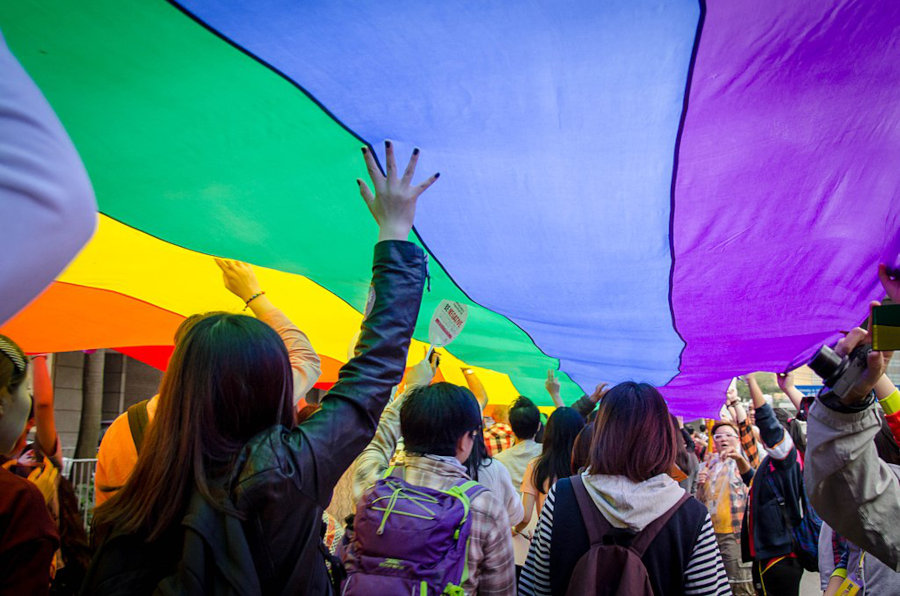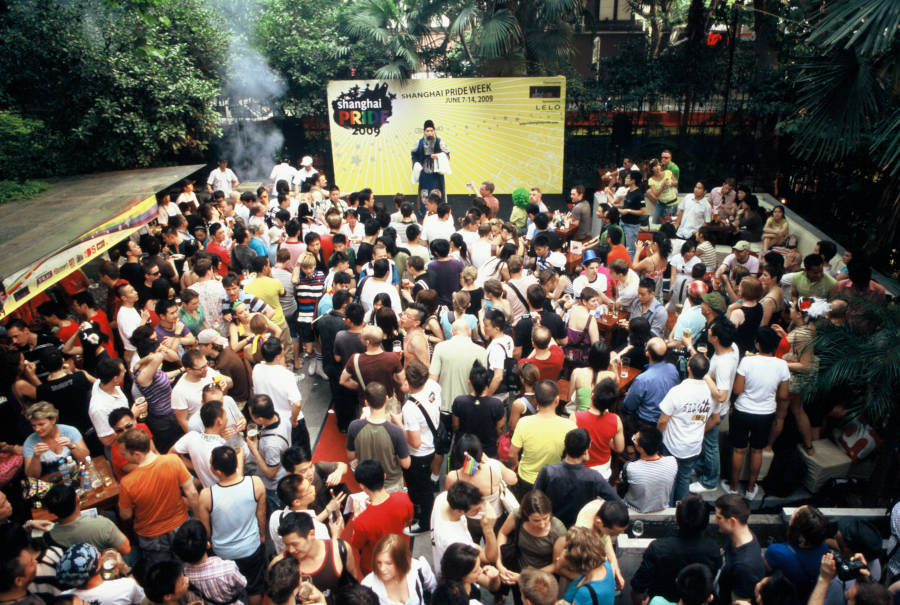As we near the end of Pride Month, we talked with Salomé Grouard, production editor at South China Morning Post and lead of the newspaper’s women and minority group initiative, Lunar and the podcast Lunar Voices, which highlights the voices of marginalized groups in Asia. As an employee at one of the oldest and leading news outlets in Hong Kong, we were eager to hear about Salomé’s stance on the barriers women and the LGBTQ+ community face in Hong Kong and how she sees attitudes towards these underrepresented and marginalized groups evolving in the coming years, especially in light of Hong Kong’s newly appointed Chief Executive and 25th anniversary of the handover.
#1 – Can you tell us about Lunar and its goal?
Lunar started as an initiative from SCMP to empower and celebrate voices of women in the region in Asia because they’re usually either marginalized or forgotten or ignored. SCMP is one of the oldest newspapers in the region and was actually the first to hire female correspondents back in the thirties. (Editor’s note: SCMP was the first Asian news organization to have a female correspondent, Helen Duncan in 1932.), so it made sense that we wanted to play a meaningful role in this.
Lunar is known today mostly through two projects. The most public one is the weekly newsletter, which gathers seven articles on women’s news and issues from all around the newsroom. Business, tech, China desk, culture, the City desk, really everywhere that will elevate the debate at least a tiny bit.
The readership has changed from 35% women to 45% women.
The second project is something within SCMP. We really want to push the newsroom to use more female sources as experts, especially because it’s traditionally a role that we give to men. This initiative has actually worked. Since we started, the readership has also changed from 35% women and 65% men, to 45% women and 55% men. It’s almost 50/50.

More recently, Lunar also decided to widen the spectrum of stories that we share because there are a lot of other marginalized voices that usually do not have a platform. We started to follow more of a diversity and inclusion path, including stories about LGBTQ+ identity, religious minorities, ethnic minorities, people with disabilities.
There’s a saying that women make up 50% of the world’s population but are treated as a minority, which is true to an extent. But then there are also some women that are discriminatory against other minorities. So the goal is not to uplift just women, but to go deeper. It’s an exciting time because the public is getting more aware of the concept of intersectionality. Society is evolving, so the content we’ve been producing has been evolving.
#2 – Only 37% of lesbian and bisexual women are out at work in Hong Kong. Do you see this number increasing?
The short answer is I truly hope so. There are two major spectrums to look at. The first one is societal and second one is professional.
This number could increase because society is definitely becoming more aware and accepting of the LGBTQ+ community, thanks to things like pop culture representation, media coverage, and the amazing work of organizations and associations here. In the past year there were some very high profile court cases, which I think really touched the public.
Companies have a responsibility to create a space where women and LGBTQ+ people feel safe to express their gender identity.
If we just look at visibility and representation, it’s definitely getting better. But the problem here is that it’s not because you’re more visible that you necessarily have a safe space to express yourself. This is where companies have a responsibility to create a space where women and LGBTQ+ people should feel free and safe to express their gender identity or sexual orientation while knowing it will not impact their professional opportunities or socialization within the company. Discrimination within companies still happens a lot for the LGBTQ+ community, even in companies where you have some forms of guidelines.
If we want this number to increase, a first step for companies is to create workshops and conferences about inclusivity. And allyship, which is also very important. But then the second step is to actually apply these guidelines because it’s very beautiful to say, yeah, we support LGBTQ+ people, but if the behavior is not following, it’s ‘rainbow-washing’ or rainbow capitalism.
You know, it’s Pride Month. Rainbow capitalism is when companies try to win money out of LGBTQ+ people while they don’t follow their company policies at all. Marks & Spencer, for example, had a sandwich a few years ago called the LGBT sandwich that was quite divisive.
#3 – One in seven directors at larger listed companies are female. Why do you think that is?

That’s a huge question. The short answer is stereotypes and discrimination. The long answer is it can be traced back to childhood. Girls’ and boys’ upbringing to social life is very different. Girls are expected to be clean and proper and pretend to cook and be a future good mom, and boys will be boys, getting into fights and destroying your jeans. It’s really two different ways of thinking.
But then what’s interesting is there was a study from a few months ago that found that Hong Kong girls actually have better grades than Hong Kong boys. It is very interesting, especially knowing that later on, we do not necessarily have the same options because we are not given the same ambitions. For example, when it comes to picking the subject you want to study, you’ll have some fields that are men-dominated. Or if you look at nurses and doctors, you have more nurses that are female and more doctors that are male. That’s because we’re not influenced to have the same ambitions in life.
Women are just not seen as good leaders in general because we’re supposed to be ‘emotional’ as future or existing moms, so we’re not a good value for the company. Then older women also face discrimination when it comes to things like menopause. In work life, women are subject to more subjective criteria, that are actually not proven, like fatphobia, beauty, and femininity, than men.
Kellogg School produced a study that proved that people have a tendency to hire candidates that remind them of themselves. If a man is hiring someone else, statistically speaking, he will be more likely to hire another man. And same with promotion. So this is potentially why in Hong Kong, less women are promoted to such high positions.
#4 – How has Hong Kong’s LGBTQ+ situation evolved in the last 10 years?
It has definitely evolved. But I think we have two different trains with two different speeds. In terms of law and government, some laws have been passed which are definitely helping LGBTQ+ empowerment. Same sex marriage is now recognized in Hong Kong if it was done somewhere else. Transgender people can now change their gender on their ID card, but only if they went through a full transition which includes sex affirmation surgery. Those are very small steps, but they’re still a first step, which is always good to take.
Cisgender and straight people are willing to get educated on this subject, which is really proof that things are evolving.
But then civil society always moves faster than governments on this kind of issue. The way Hong Kong perceives and supports LGBTQ+ people has definitely involved evolved way more in a positive way. There’s more representation in pop culture, media have increased their coverage, and associations/organizations are doing a pretty amazing work on promoting and especially educating people. That’s maybe one of the biggest markers, that cisgender and straight people are willing to get educated on this subject. That’s really the proof that things are evolving.

Today, surveys have shown that Hong Kong is actually ready to support same sex marriage and support LGBTQ+ people in general. It’s just that now governments and laws have to move forward too. And maybe with the new chapter in Hong Kong with John Lee, we can still hope that it’s gonna happen.
#5 – Do you see gay marriage being legally recognized in Hong Kong anytime soon?
There are dual identities in Hong Kong that will just make this issue complicated to predict. One is the international hub inside of Hong Kong where diversity can be a strength. The city wants to attract a lot of young dynamic people from different places and backgrounds, and obviously I think this side would definitely support gay marriage. But on the other side we have a more conservative force that supports that Chinese values in general are not compatible with LGBTQ+ people.
What else? Obviously what happened with civil society through and after the protests makes it also more complicated to know what we can ask or not. Adding to that, I think it depends to what extent the Chinese government will influence the Hong Kong one, because the government hasn’t exactly been supportive of the LGBTQ+ community over there.
There are still no real laws about discrimination when it comes to gender and sexual minorities. Conversion therapies are still legal.
I really hope we get over that at some point, because it’s not about us versus them all the time and it’s not always about traditional versus modern. It’s also about the actual wellbeing of individuals and especially, sometimes, their survival.
But also when we talk about gay marriage, there are so many other laws that need to be passed in Hong Kong. There are still no real laws about discrimination when it comes to gender and sexual minorities. Conversion therapies are also still legal. There’s a lot to be done when it comes to laws. The past government has been a bit more progressive than some other governments in the region, so I think we just need to see what the next government is going to do because it will definitely influence the public opinion.
#6 – China has a complicated history with acceptance of gay people. Where do you see attitudes in China heading in the next 10 years?
History all around the world has kind of erased LGBTQ+ people from history, but we’ve always been there. Where it’s going in the next 10 years is a bit complicated because it’s still a very taboo subject in China. Some people are still going to prison for it in some places, which is extremely worrying. Recently, there has been a crackdown on tech, video games, and a lot of education; a lot of different sectors that involve how the youth is gonna grow up in China. And the LGBTQ+ people have been really targeted into that.
Around 70 million people in China, which is 5% of the population, identify themself as part of the LGBTQ+ community.
The Shanghai Pride, which used to be a huge event, has been canceled since a few years ago. (Editor’s note: Cancelled in 2020, Shanghai Pride was the longest-running and main Pride event in China.) Male idols that are considered too feminine are asked not to appear on TV anymore. You have a few LGBTQ+ groups on social media, including Weibo, that have been shut down because the new way of seeing it is it’s not compatible with traditional Chinese values. And so LGBTQ-ness is really portrayed as something from the West by the government. But on the other side, there’s still a huge LGBTQ+ community in China. Around 70 million, which is five percent of the population, identify themself as part of the LGBTQ+ community. I mean, that’s huge.

And we are talking about generations that have been living with censorship from either social media or the government for their whole life. It’s a very resourceful and clever community and I think we should not underestimate them.
One of my colleagues wrote an interesting article about how LGBTQ+ people in mainland China are trying to, not reject, but get more far away from the Western model of getting visibility. Since restrictions are so important in China when it comes to queerness, then we can’t use what they describe as the flamboyant Western way of celebrating queerness, for example.
Being part of the LGBTQ+ community is a huge spectrum, so the way to make it visible and claim this identity is also really diverse. I hope it’s going somewhere. They’re trying to find solutions and it’s very complicated to figure out one way that works. It’s gonna be a few thousand different ways that will eventually work for the common good.
(Editor’s note: SCMP’s Hong Kong at 25 gives an overview of key events in Hong Kong over the past 25 years.)

Salomé Grouard is a Digital Production Editor at South China Morning Post. She is newly at the helm of Lunar, a weekly newsletter gathering stories about gender and marginalized communities, and podcast Lunar Voices. Originally from France, Salomé came to Hong Kong in 2019 to study her Master of Journalism. She freelanced for French newspapers, naturally presenting articles in a gender-oriented way, finally arriving at SCMP after university as a Production Executive.
Disclaimer: The opinions expressed in this publication are those of the authors and do not necessarily represent the views of The HK HUB.
Image credits: The HK HUB and Salomé Grouard




